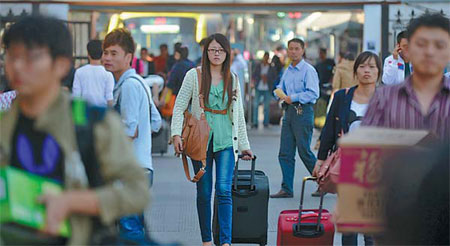Separation issues
Updated: 2012-11-04 10:12
By Liu Zhihua (China Daily)
|
|||||||||||

 |
|
Commuting is part of the urban lifestyle, but couples do better to stay together than apart. Meng Delong / for China Daily |
Making good while they are young and able is driving young married couples in China apart - at least during the week. Liu Zhihua looks at why these 'weekend' unions are fraught with dangers.
Members of China's famous rural migrant labor force take on menial jobs in the big cities because they can earn more than what they make at home. If it means they are separated from their children and family for long stretches of time on end, it is a cost they are willing to pay for a better financial future. At a totally different level up the economic pyramid, there are urban folks who are in the same plight, and basically for the same reasons. They are up and coming, the ambitious young executive climbing up the corporate ladder, the young entrepreneur devoting time to her new business, the double-income-no-kids couple saving for a bigger house, car and family.
They are married, but living apart because their work takes them away from each other.
Chao Jie (not her real name), 30, is a case in point. The Shanghai resident lives in paradise every weekend when she meets up with her husband in the suburbs, but says she goes back to a living hell during the weekdays when she has to stay in town for work.
The separation is difficult because the couple is newly wed. Chao met her match in April 2010, when she was just starting up her public relations company. The two quickly fell in love and got married earlier this year.
Because they cannot afford sky-high property prices in Shanghai, her husband has chosen to live in his parents' house in the suburbs, while Chao rents a room near her company.
Every weekend, Chao makes the long commute back to the suburbs.
"We are passionately happy on Friday and the weekend, but it's sad when Monday comes and sometimes we quarrel. During the week, we count the time until we can be together," Chao says.
The separation is telling on the relationship and Chao says she cannot help yelling at her husband, even though she always feels guilty afterwards.
Because of their inexperience, Chao's first pregnancy miscarried at 50 days, which has added to her depression.
Her frequent clashes with her husband have also infuriated her mother-in-law, who is telling her husband to get a divorce. In fact, after a particularly fierce fight, he did suggest they end their marriage.
"Although he apologized later, saying he was in such a fury and didn't really mean it, what he said hurt me so much," Chao says.
Her situation is not unique. In fact, weekend couples are common in many major cities.
"Quite a lot of people around me are weekend couples or those who only see their spouses once every month," says a young woman working for an embassy in Beijing, who asked to be called Gai Fan.
Among her friends, there are several couples who live apart in different cities. Many more have to travel within China or abroad, and spend little time at home. All for work, Gai says.
Gai was like them, but she ended her "separation lifestyle" earlier this year. Previously, her husband was working in Tianjin and they could only meet in Beijing every weekend. She remembers those days as bittersweet.
"We could not see each other often, so we cherished every minute we were together," Gai recalls.
But there were undercurrents, too.
"Although we stayed in touch through phone calls most of the week, I still felt like a single woman.
"And, if he didn't answer my calls at once, I would start worrying about accidents or other bad thoughts. Sometimes, I would even suspect he wasn't loyal."
Deng Lizhen, 31, from Shenzhen, Guangdong province, is coping a lot better.
Her husband, Liu Weiwei, 29, recently made a move to Guangzhou, capital of Guangdong, because he was offered a new job.
They only meet up on weekends, either in Shenzhen or Guangzhou, about an hour's train ride both ways.
On weekdays, they are both too busy working to see each other.
Deng is a senior sales executive with the online dating company Century Love and her husband is an executive in the medical industry.
During the week, they keep in touch by sending online messages and they telephone each other before bedtime.
"It is the first time we have been apart in the last 10 years," Deng says, adding that they met in 2003, and got married in 2010. Their child is 6 months old.
The first week after Liu went to Guangzhou, Deng caught a severe cold, and she had to take care of herself. It was really depressing, she says.
"But we have to do this because we need the money."
Living in Shenzhen and raising a child is expensive, and they have just bought an apartment. Her husband's new job comes with a fat paycheck, which helps, although he will have to stay in Guangzhou for the next three years.
Deng believes that a minor separation may actually benefit the relationship, because they have been together for almost 10 years.
She says that one unexpected result of their temporary separation is that she is performing better at work, as she has thrown herself into her job.
The downside is that she misses her husband, especially when she hits a snag and needs to discuss her problems with him. She also worries about his health, because he is not used to taking care of himself.
"It is a price we must pay for better career development and our relationship," Deng says.
Experts say that the price may be higher than they think.
Married couples should stay together and being apart wreaks havoc, say the experts, who add that if issues are ignored they often get worse with time.
"I think the 'weekend couple' is against human nature," says Han Xueqing, director of the Clinical Psychology Department at Beijing Tongren Hospital.
Human beings are constantly in pursuit of security and safety most of their lives, he says, and spouses may feel insecure or feel that their marriage is threatened if they are apart most of the time.
In a society that is now morally wide open and full of pressure and temptations, constant separation will harm the chemistry between spouses. The old adage that absence makes the heart grow fonder is not always true, and being away from each other may slowly kill the intimacy of marriage, Han says.
"Marriage needs maintenance. It is very important for weekend couples to have effective communication and mutual trust."
Wu Can, 35, a marketing manager with a Fortune 500 international company in Shanghai, could not agree more. He knows it takes really hard work to keep a long distance relationship working.
His wife, Liu Tao, has been running her early education startup in Changshu city in Jiangsu province since 2008. Changshu is about 115 km from Shanghai, where he works.
Both are kept busy with work, so they talk on the phone for about an hour on workday evenings and enjoy some quality time during the weekends with their 2-year-old daughter.
They may take a stroll, shop or make a day trip to nearby attractions, or just stay at home and enjoy each other's company.
However, life was not like this at the beginning when they were still trying to find that elusive balance.
"We quarreled a lot over trifles from the beginning to about a year after we started living apart," says Wu. "I guess that was because we were vulnerable to the pressure of our jobs. We were missing each other, but we couldn't help venting our frustrations by picking on each other and becoming very demanding."
It took a lot of effort to overcome the hurdles. Wu says he is glad that he persisted in making constant phone calls and communicating with his wife, especially when she was facing difficulties with her job. He did this even after they quarreled.
"We trusted each other's loyalty and maturity completely, but it was still hard to cope with the distance, and to be able to talk to each other effectively at the beginning," Wu says.
"It was her dream to have her own business, so I did my best to make her feel I will always support that. It worked."
Wu and Liu now tell each other their dreams, share the funny things that happen at work, talk about their parents and families - all on the phone.
"We are both very independent people, and very rational. When one of us feels exhausted or disappointed, the other is there to support and give suggestions."
To a certain extent, their combined efforts to make the marriage work have borne fruit. In early 2010, their daughter was born. Liu's business is off the ground, and a new baby is on the way.
They plan to return to Shanghai as soon as Liu's employees can take care of the business.
Chao Jie, the young public relations boss in Shanghai, also plans to move back with her husband as soon as possible.
They are on the right path, says Han Xueqing. "Even when it is necessary to live apart for some reason, it should only be a temporary arrangement. A couple should live together."
Contact the writer at liuzhihua@chinadaily.com.cn.
Related Stories
Telling the story toughest part of 'Life of Pi', says Lee 2012-10-30 12:53
Blessed are those who are happy 2012-10-22 10:19
Envoys in focus 2012-09-13 13:27
The ultimate choice 2012-08-29 13:20
Celebrating London 2012-08-24 13:51
On modern life 2012-08-24 10:53
Today's Top News
Rescuers race against time for quake victims
Telecom workers restore links
Coal mine blast kills 18 in Jilin
Intl scholarship puts China on the map
More bird flu patients discharged
Gold loses sheen, but still a safe bet
US 'turns blind eye to human rights'
Telecom workers restore links
Hot Topics
Lunar probe , China growth forecasts, Emission rules get tougher, China seen through 'colored lens', International board,
Editor's Picks

|

|

|

|

|

|





